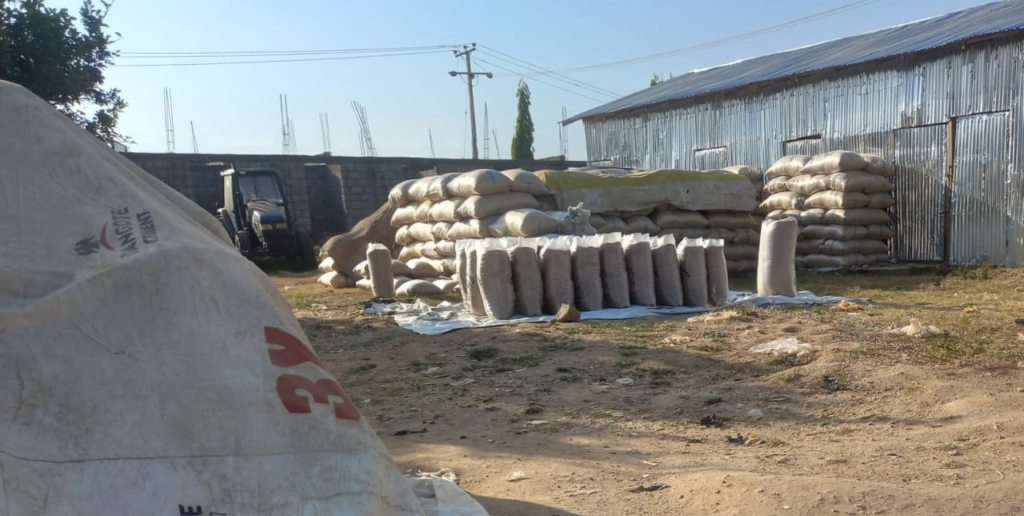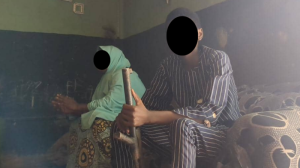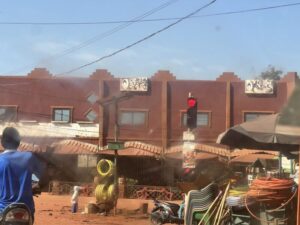Internally displaced persons (IDPs) in the Federal Capital Territory (FCT) of Nigeria have had to deal with a lot of challenges in a bid to achieve meaningful and decent lives. Having fled from the troubled North East of Nigeria since 2014, the IDPs have decided to take their destinies in their hands through farming, but not without some challenges. CHIKA MEFOR-NWACHUKWU tells the story.
As Yakubu Ibrahim Viva, coordinator of the nursery section of Sharing Prosperity School (SPI) in the Internally Displaced Persons (IDPs) Camp, at New Kuchigoro in the Federal Capital Territory (FCT) sang the nursery rhymes to his pupils, his visage betrayed palpable worry and anxiety as he appeared to be wondering about the safety of the crops on his farm. Viva’s uneasiness was not unconnected with the recent invasion of his farmland by herders and their cattle. Viva is not just a passionate teacher, but he is also a passionate farmer.
For him and the other IDPs in the camp, farming is not just a means for survival, but a way of life. The 48-year-old IDP arrived at the FCT in 2020 following several failed attempts to return to his hometown of Gwoza Local Government Area of Borno State, after the Boko Haram onslaughts of 2014.
His passion for teaching propelled him to help out in the makeshift school which was started through the collaboration of the IDPs and some NGOs.
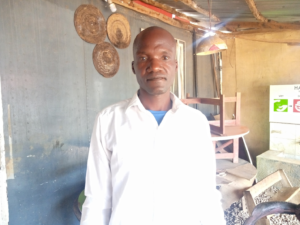
“I started working here in February last year. It was the insurgency that forced me to come here. They still occupy our local government. I spent some time in Maiduguri but decided to come down here,” he narrated.
Farming is part our culture
Despite Viva’s passion for teaching, his love for farming didn’t’ wane as according to him, ‘farming is the way of life and culture of our people.’
“Since I was little, I used to farm. It is a part of me. It is a part of our culture,” he said.
But continuing this “culture” in a place that isn’t his ancestral land has proved very challenging for Viva. Before the insurgency in Borno State, the Gwoza people cultivated all sorts of crops on their home soil and therefore needed almost nothing from the government to stay alive. But now, those lands are being occupied by insurgents, explained Viva.
Our Challenges…
Viva and other IDPs then sought lands for farming in the neighboring state of Nasarawa where they now cultivate beans, corn and other staple crops. Securing farmlands did not prove difficult as there are vast arable lands in Nasarawa. The challenge however was in sourcing money to lease lands, since the farmlands were not given out for free like it was being done in Viva’s home state of Borno.
“The cost of leasing the lands depends on the size of the land. Each hectare is leased for 15,000 naira or more, depending on one’s bargaining power,” he disclosed.
Farming, he said, is capital intensive. How then did the IDPs get funds to bankroll their farming activities? Viva explained that some of the IDPs were lucky to have gotten capitals from their families and friends.
“I am part of the lucky ones because I got some money from my friends and family. This year, I was able to get 10 hectares on which I cultivated beans. I was able to do this because I had someone to help me. When you don’t have people to help you, it becomes a very big challenge. Imagine the fate of those who have no one to run to?” he queried.
IDPs who do not have the capital to farm, either resort to loans from individuals or engage in a type of ‘trade by barter’ that allows them to pay for the leased land with their farm produce after harvesting.
Collecting loans or paying with harvested crops often left the displaced persons frustrated as they usually ended up not deriving commensurate values and rewards for their labour, revealed Ladi Matthias, the Woman Leader of the camp.
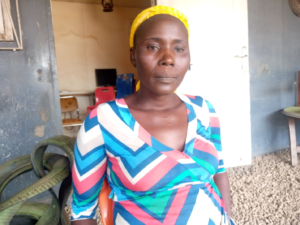
“I usually collect loans. When I harvest and sell my products, I return the money with high interest. After that, there is only little to keep for myself. And from this same little, I will pay the children’ school fees, take care of health bills and do other expenses. When another farming season comes, I take loans again and the circle continues,” explained the dejected mother of nine.
The farmers did not only contend with the lack of capital to lease farmlands, but they also contended with the lack of agricultural tools needed for their work. For example, Ladi and the other farmers rent knapsack sprayers for applying chemicals such as fertilizers, herbicides and fungicides on their farm.
“I rent the one I use. Depending on how sympathetic the renter is, I can pay N1000 or more for a day’s work, and at times, one day is not even enough,” she narrated.
Another major challenge for the IDPs and many other farmers in Nigeria is the farmers/herders’ crises. According to the Armed Conflict Location and Event Data (ACLED) report of 2021, Nigeria has lost no fewer than 8,343 persons to the conflict, since 2005. While the IDPs can be said to have been lucky to have not experienced any deaths from the crises, the same cannot be said of their crops.
Just last week, Viva received a call from a man who works with him on the farm, and he was informed that some herders had allowed their cattle to graze on his farm, and that his crops were gravely destroyed. The sad incident occurred at night time, so no one could say who the culprit was.
Viva stated that whenever such happened, they either let it go and count their losses or report to the police. In his own case, he didn’t report because he did not know the culprit/s.
“Around September this year, one of my cousins’ farms was destroyed by herders. He went and reported it to the police, and the police came and arrested the culprits, and they paid him N500,000 in compensation,” he narrated.
While the IDPs try very hard to maintain cordial relationships with their host communities and landowners, there are still times when the indigenes of the communities become envious of the IDPs’ bumper harvests and productivity.
“God has blessed us with the ability to farm and work very hard. We are not lazy and we are not afraid of the Sun. When they notice our harvest, they are not always happy. They usually spend just a few hours on the farm and leave. Again, they don’t like putting in money into their farming. It is money that brings money,” he noted.
Umar Gola, spokesperson of the IDP camp in Durumi, Area 1, corroborated this statement and explained that because the IDPs have been farming even from their earliest days, they have been able to acquire skills and experience that enable them generate bumper harvests. Gola added that this feat was noticed by the landowners who took back their lands from them out of envy.
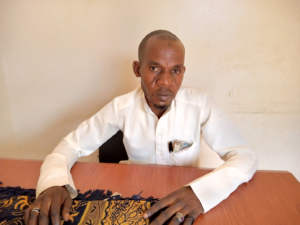
“After seeing the bumper harvests we generated, they took back their lands, and we were left with the option of looking for other lands,” he said.
Gola, who is also a farmer, could not take part in this year’s farming because he had to spend all he had on a relative who was sick.
Apart from lack of capital, he stated that the biggest challenge to farming presently was insecurity. He narrated how one of the displaced persons in his camp had travelled to Borno State to cultivate his crops and was killed by the insurgents in the process.
“The insurgents collect money from the people before allowing them to farm. They will not disturb the farmers while they are cultivating and grooming, but will descend on them during harvesting. One of the IDPs who traveled home to farm was killed. They killed him in Gwoza when he went to harvest his produce,” he narrated.
Gola explained that the displaced persons sought farmlands outside Abuja because they found it difficult to obtain lands in the FCT, and that the soil in the Abuja is not too fertile for cultivating beans.
Even with the insecurity and lack of funds, many of the IDPs have strived to continue farming. According to Enoch Yohanna, Camp Coordinator of the New Kuchigoro Camp, farming has not only saved the IDPs from being dehumanized, but that it has also distracted them heal from the trauma they have had to endure following the Boko Haram invasions.
How the farming activities started…
Most of the IDPs in the two camps visited, came to the FCT seeking refuge after the horrendous 2014 Boko Haram onslaught. While they have received varying degrees of assistance from the government and NGOs, the assistance has however dwindled over the years, leaving the displaced persons to their fate.
Matters became even worse when the government categorically stated that there were no IDP camps in the FCT, implying that the IDPs were not in any way recognized, and leaving them in constant fear of being evicted from their place of abode. Thus, the displaced persons began to think of ways to survive.
“The federal government, through FEMA and NEMA, has let us know that there are no IDP Camps in Abuja. They will not recognize us. We don’t have any benefits or protection under the IDP laws. So, we have a shortage of food in the camp. We need to fend for ourselves and proffer solutions to our problems.
“We went to Nasarawa State: myself, Mr. Philemon Emmanuel who is the camp chairman, and some other persons, to meet with some village chiefs. We came up with a plan in 2015 to resettle the IDPs. The chiefs agreed to give us land to farm on and many of us went there to dwell permanently, while some others went there to farm and came back after farming,” Enoch explained.
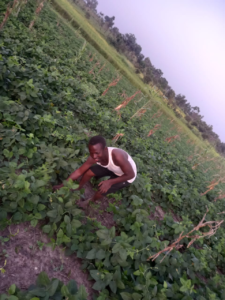
“The first place we visited was Ankoma, in Karu Local Government Area of Nasarawa State. The land owners welcomed us after hearing our stories and were happy to give us lands and accommodation,” he added.
We are no longer liabilities…
Enoch stated that their bold move was a way of showing the government that they were no longer liabilities, and that with adequate support and encouragement, they could go as far as contributing immensely to the growth of the country.
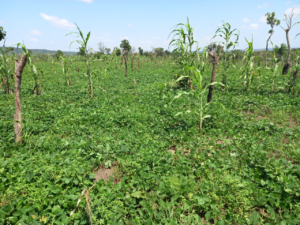
He further revealed that the displaced persons in the FCT and Nasarawa State were able to establish a beans market which they called IDP Beans Market in Auta-Ba Lefi in the Nasarawa State. From the beans market, they ship their produce to other states of the country. They also constructed a large storage facility for their produce.
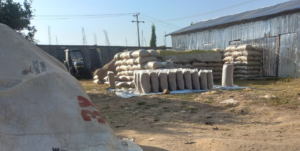
Not yet uhuru…
But it is not yet uhuru for the internally displaced persons as they still need the government to support them with low-interest loans and agricultural tools in order for them to contribute their quota to food production in the country.
“Some of the IDPs are taking loans at 50 per cent interest which for me is exploitation. We can be included in the Anchor Borrowers Scheme of the federal government or allowed to get low interest loans for the Bank of Agriculture. Apart from these, the government or senators from Borno State can donate tractors to farmers or rent them at subsidized rates. Through farming, the IDPs are doing well. Imagine what they can do if they have access to all these?” Enoch queried.
What does the government have to say?
The National Commission for Refugees, Migrants and Internally Displaced Persons (NCFRMI), formerly known as the National Commission for Refugees (NCFR), is an agency established in 1989 to manage the affairs of refugees, migrants and IDPs in Nigeria. We reached out to the Commission to enquire about what the ministry is doing to help these displaced persons succeed in their farming activities since their success will also mean their contributing to the nation’s economy. And the Deputy Director, IDP Resettlement, Musa Kangiwa, told the reporter to write officially to the Commission. No feedback was received from the Commission as at the time of writing this story.
Also, the Director of Information, Federal Ministry of Agriculture and Rural Development, Dr. Joel Oruche, insisted that an official letter be sent to the Permanent Secretary of the ministry which, as at the time of writing this story was sent and no feedback received.
This investigation is produced by Safer-Media Initiative (SMI) with the support of the Wole Soyinka Centre for Investigative Journalism (WSCIJ) under The Collaborative Media Engagement for Development, inclusivity and Accountability Project (C-Media Project) funded by the MacArthur Foundation.

